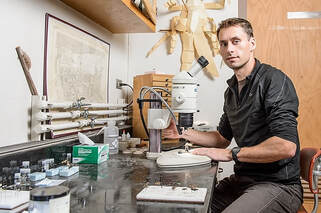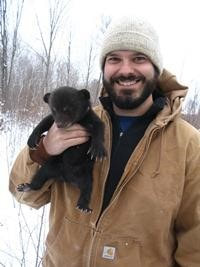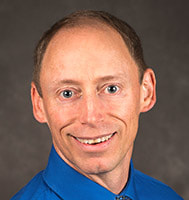view past presentations on You Tube
December 4, 2019 Insects: Tiny Things that Run the World
Patrick (PJ) Liesch, UW Madison Department of Entomology Insect Diagnostic Lab
Patrick (PJ) Liesch, UW Madison Department of Entomology Insect Diagnostic Lab
|
Insects: The Tiny Things that Run the World
Patrick (“PJ”) Liesch is a statewide entomology specialist within the UW-Madison Department of Entomology. PJ’s primary role is to serve as the director of the University of Wisconsin Insect Diagnostic Lab where he handles approximately 2,500 insect identification requests every year. PJ also teaches on the UW-Madison campus and provides entomology-related outreach throughout the state, including regular appearances on Wisconsin Public Radio’s The Larry Meiller Show. The ant expert E.O. Wilson said it best when he famously described insects and other invertebrates as, “the little things that run the world.” Wisconsin is home to over 20,000 different insect species and over a million are known from around our planet. PJ will discuss these amazingly diverse, complex, and fascinating creatures and the many roles they play in the world around us. |
November 6, 2019 From Beaver to Bear: Wisconsin DNR’s Wildlife Research Program in the Northwoods
Dave McFarland, Wisconsin DNR
Dave McFarland, Wisconsin DNR
|
David MacFarland is the Wildlife Research Team Leader for the Wisconsin DNR’s Division of Fish, Wildlife, and Parks. In this role since 2017, Dave supervises and coordinates the DNR’s wildlife research program within the Office of Applied Science.
Join Dave for a conversation about wildlife research in the Northwoods. He will provide an overview of the DNR’s wildlife research program in Wisconsin with a special focus on specific projects here in Northern Wisconsin. Dave will also discuss the importance of science in the agency. The decisions made over the next few years will lay the foundation for several decades of wildlife management. Dave works and lives in Rhinelander with his wife and two children. |
October 2, 2019 The Search for Earth-like Planets
Maggie Turnbull, UW Madison
https://www.embopress.org/doi/10.15252/embr.201439314
Maggie Turnbull, UW Madison
https://www.embopress.org/doi/10.15252/embr.201439314
|
|
Dr. Margaret (Maggie) Turnbull, Ph.D is an astrobiologist whose expertise is in identifying planetary systems that are capable of supporting life as we know it. One of her ongoing passions is in understanding our nearest neighboring stars in detail, especially with regard to whether these stars might have habitable planets orbiting them, and what kind of technology it would take to discover and explore them. She developed a Catalog of Habitable Stellar Systems for use in the search for extraterrestrial intelligence (SETI), and she has studied the spectrum of the Earth to identify the telltale signatures of a living planet. She is currently leading the science team for NASA’s WFIRST mission, slated for launch in 2025, and in 2019 she was appointed to NASA’s Starshade Technology Working Group. WFIRST will be the first mission to take pictures of planetary systems orbiting the nearest sunlike stars, and the first mission with the hope of determining the atmospheric composition and surface characteristics of those planets.
Astrobiology is a field of science that combines Astronomy, Earth and Planetary Science, Chemistry, Physics, and Biology to explore the possibility of life throughout the universe and ask, “Are We Alone?" Maggie received her Bachelor of Science degree in Astronomy from the University of Wisconsin-Madison, and her M.S. and Ph.D. from the University of Arizona in Astronomy and Cell Biology. When not thinking about alien worlds and missions to get us there, Maggie can be found keeping honey bees, raising monarchs, tapping sugar maples, canoeing, and cross country skiing across the north woods with a beautiful community of fellow outdoor-loving women, men, children, and dogs |
September 4, 2019 Sleeps Impact on Health, Memory and Aging
Dr. Steven Barczi, UW Madison, C0-Director of Geriatric Clinical Operations
Dr. Steven Barczi, UW Madison, C0-Director of Geriatric Clinical Operations
|
Dr. Steven Barczi, Director of Geriatric Clinical Operations at the Madison VA Geriatric Research, Education and Clinical Center, and Professor of Medicine, Geriatrics and Sleep at the University of Wisconsin - Madison, will join us for a conversation on “Sleep”. Dr. Barczi is nationally recognized as a medical educator and directs one of the premier fellowship programs in the country. He has received national and local awards of excellence as an educator and leads various clinical programs in geriatrics at both the UW Hospital and the Madison VA Hospital.
Dr. Barczi plays a major role at the UW to direct the institution on establishing new directions in geriatric clinical models, education and curriculum development. He has a geriatric specialty practice and an adult/older adult sleep medicine practice. Speaking regionally and nationally on topics in sleep changes in aging, sleep changes and dementia, geriatric and dementia telemedicine and geriatric workforce development, Dr. Barczi’ s conversation will be one you won’t want to miss. Join us for a conversation about sleep, aging and your health. |
June 5, 2019 Social Implications of the Genomics Revolution
Jason Fletcher, UW Madison, Agriculture and Applied Science
Jason Fletcher, UW Madison, Agriculture and Applied Science
|
|
Jason Fletcher, Ph.D. is a Romnes Professor of Public Affairs with appointments in Sociology, Agricultural and Applied Economics and Population Health Sciences at the University of Wisconsin-Madison. He has studied the intersection of genetics and social sciences for years. A health economist by training, he has worked to integrate genetics and social science over the past decade, culminating in his book with Dalton Conley: The Genome Factor: What the Social Genomics Revolution Tells Us About Ourselves, For a century, social scientists have avoided genetics like the plague. But the nature-nurture wars are over. In the past decade, a small but intrepid group of economists, political scientists, and sociologists have harnessed the genomics revolution to paint a more complete picture of human social life than ever before. Jason’s research tackles controversial topics such as genetically personalized education and the future of reproduction in a world where more and more of us are taking advantage of cheap genotyping services like 23andMe to find out what our genes may hold in store for ourselves and our children. Join us for a conversation about genetic testing and your choices and risks. |
May 1, 2019 How Wisconsin Became the Dairy State
John Lucey, UW Madison, Department of Food Science
John Lucey, UW Madison, Department of Food Science
|
|
John Lucey, Ph.D. is the director of The Center for Dairy Research (CDR) at the University of Wisconsin-Madison and a Professor of Food Science at UW-Madison. The CDR, which is supported by dairy farmers through their milk sales, has over 30 researchers and is one of the premier dairy research centers in the United States. The center explores the functional, flavor and physical properties of dairy products. The CDR staff provides innovation, education and technical support for the dairy industry. John provides leadership on CDR programs, budgets, administration, staff and he represents CDR to the university, state, funding agencies and industry. John also provides management oversight to over 20 research projects which are conducted by his staff. Join us for a conversation about how Wisconsin became integral to the dairy industry and current research occurring at the University of Wisconsin. Article: Center for Dairy Research gets grant to create dairy drinks that don't need refrigeration |
April 3, 2019 Shoreland Plantings
Patrick Goggin, UWSP and UW- Extension Lakes
Patrick Goggin, UWSP and UW- Extension Lakes
|
|
Patrick Goggin works for the University of Wisconsin-Stevens Point College of Natural Resources and the University of Wisconsin-Extension Lakes. Patrick works closely with the Wisconsin Lakes Partnership team, collaborating on the development of educational programming and materials for people on lakes. Areas of interest for him include helping lake organizations with their community
goals, sharing lake management tools and resources for aquatic ecosystems, and aiding people in gaining a better understanding and appreciation for the native flora of Wisconsin lakeshores. Patrick will share the story of change on Wisconsin lakeshores and what those changes have meant for lake health and clean water. He will describe the diversity of life found along lakeshores and what some of the ecosystem services lakeshores provide to the lake system. He will also give examples of what lakeshore property owners and other lake lovers within the watershed can do to help make lake water cleaner and ideas on how to restore habitat. |
March 6, 2019 Osprey Research in Wisconsin
Bruce Bacon
Bruce Bacon
|
|
Bruce Bacon graduated from the UW Stevens Point with a BS in Wildlife Management and Biology and a minor in Environmental Law Enforcement. He worked for over 34 years with the Wisconsin DNR in Wildlife Management and Wildlife Research. Bruce’s research began in South Eastern Wisconsin, followed by time at the Mead Wildlife Area and waterfowl research in St. Croix and Polk Counties. The last 20 years Bruce spent in the Mercer area concentrating on raptors.
Bruce will discuss the biology of osprey, population status, history of management in Wisconsin and the specifics of the Iron County osprey project. Factors, both historic and current, that affect osprey populations along with insights from a 3-year study where cameras were positioned on osprey nests offering a unique perspective on this raptor. Join us for an enjoyable evening discussing raptors. |
February 6, 2019 High Capacity Wells and Ground Water
Mallika Nocco, UW Madison, Nelson Institute
Mallika Nocco, UW Madison, Nelson Institute
|
|
Mallika A. Nocco, Ph.D. is a David H. Smith Conservation Research Fellow in the Department of Soil, Water, and Climate at the University of Minnesota-Twin Cities. She is a soil-plant-water scientist who focuses on irrigation and crop water use. Her path to science was unusual—she graduated with a literature degree and worked in sales before falling in love with the plants and soil in her garden. She received her M.S. in Soil Science (2012) and Ph.D. in Environment and Natural Resources (2017) from the University of Wisconsin-Madison. The degradation of trout streams, lakes, and wetlands associated with heavy groundwater withdrawals and irrigated agriculture is one of Wisconsin’s greatest environmental challenges. Mallika studies the water and energy cycles in the Wisconsin Central Sands region and works closely with growers to identify and critique conservation solutions. Her research quantifies the impacts of irrigated agriculture on water quantity, quality, and climate. She targets conservation roadblocks at the farm, watershed, and regional scales using field measurements, aerial imagery, and dynamic ecosystem models to connect agricultural management decisions with their environmental outcomes. Join us for a conversation about agriculture, water, and conservation! |
January 2, 2019 Hibernation How Do They Survive the Winter
Edna Chiang, Ph.D. Candidate, UW Madison, Microbiology
Edna Chiang, Ph.D. Candidate, UW Madison, Microbiology
|
|
Edna Chiang is a Ph.D. Candidate in the Microbiology Doctoral Training Program at UW-Madison. Raised in Michigan, she completed her BS at the University of Michigan in Microbiology and Spanish. As a National Science Foundation Graduate Research Fellow and a Wisconsin Idea STEM Fellow, she is passionate about science communication and excited to share her work with Minocqua Science On Tap.
Edna works with Dr. Hannah Carey, Professor of Comparative Biosciences, to study the symbiosis between hibernating mammals and their gut microorganisms. Both hibernators and their microbes experience extreme changes in diet and physiology throughout the year, which inspires a variety of exciting questions. How is hibernation different from sleeping? How do hibernators and their gut microbes work together to survive the winter? And what does any of this have to do with space travel? Join us for a night of stimulating discussion to find out! |



